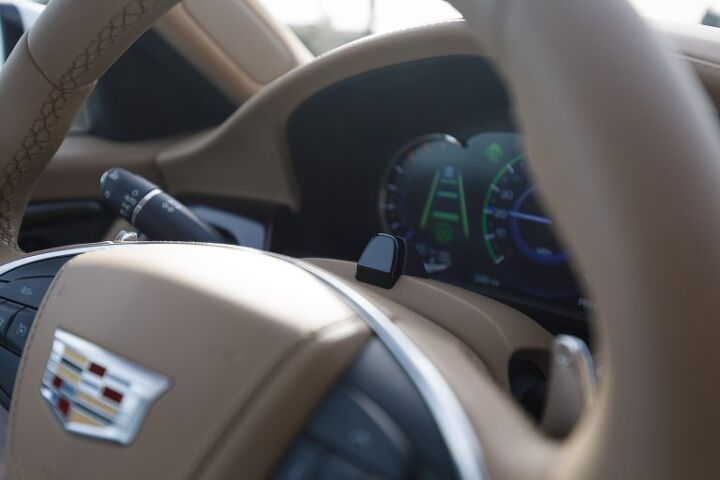#StudiesAndReports
Survey Suggests Americans Still Doubt EVs [UPDATED]
While plug-in vehicles are catching on in Europe, representing 21 percent of all new registrations in the first quarter of 2022, they’ve been less popular in the United States. Only about 5.2 percent of American registrations were of the plug-in variety (representing hybrid and purely electric vehicles) during the same timeframe. Despite the industry spending billions to develop and market these vehicles, with some progress being made, the overall take rate within North America remains underwhelming.
Ardent fans of battery based powertrains will undoubtedly disagree. But a couple of studies came out this month that drove the point home. Autolist’s Annual Electric Survey dropped earlier this month, effectively outlining why EVs haven’t been able to make more headway in the states.
AAA Endorses Driver-Monitoring Camera Systems
Despite the automotive industry collectively promising to commence deliveries of self-driving cars in 2019, autonomous vehicles have remained test platforms for technologies that don’t yet seem ready for mass consumption. Public perception of the concept has also endured a few setbacks after several fatalities involving partially autonomous vehicles received national media attention. Today, the relevant technologies have failed to mature as swiftly as indicated and there are a whole host of legal ramifications to contend with.
Selling an automobile that’s marketed as being able to drive itself (even partially) are exposing automakers to a whole new demographic of lawsuits, so they’re desperate to install failsafe measures that places the onus of responsibility back onto the driver. Their current favorite is driver-monitoring cameras, which the American Automobile Association (AAA) likewise believes are probably the best solution. The outlet recently shared the results of a study attempting to determine which driver-engagement systems worked best and decided that in-cabin cameras were the leading choice in a batch of bad options.
Auto Theft Becomes Fashionable Again, Most Stolen Vehicles of 2020
Car theft has been trending downward over the last couple of years. According to data from the Insurance Information Institute, 2019 represented a 4-percent decline in thefts across the United States vs the previous annum. But things look even better when you zoom out. The Federal Bureau of Investigation estimates that automotive transgressions have fallen by 64 percent since 1993, mimicking the general trajectory of property and violent crimes within that timeframe.
Unfortunately, crime is back on the rise and vehicle theft is coming along for the ride. Let’s explore the how and why before determining if your personal ride happens to be a preferred target. Then we’ll get into what you can do about it because the latest statistics are pretty disheartening.
Is the Auto Aftermarket Healthy? SEMA Says Yes
SEMA, the Specialty Equipment Market Association, has released its Fall 2020 State of the Industry report, which denotes the health of the automotive aftermarket despite the disruption caused by COVID-19. This report provides companies with the information needed to make good business decisions, not to put a positive spin on a time of uncertainty.
U.S. Car Sales Are Down, Average Transaction Prices Are Up
Yesterday, we covered how the economic ramifications of the pandemic has negatively impacted the sales volume of electric vehicles (the ones that aren’t status symbols, anyway) in the United Kingdom. We’ll take a broader view of things today, focusing entirely on the general sales trends taking hold in the United States ahead of the Labor Day weekend.
Under normal circumstances, this would be a period where dealerships tempt the public with juicy discounts to clear out their lots for the subsequent model year. But the pandemic has left factories idle for months and vehicles in short supply. While that wasn’t an issue when everyone was first locked indoors, many states allowed their citizens to reclaim their autonomy as dealers sought new ways of selling without the face-to-face rigamarole of interacting with customers directly. We’re now in a situation where demand remains suppressed but has increased to a level where it outpaces the supply of many popular models — increasing the average transaction price of vehicles.
It’s not a great time to be shopping for a car.
Study: Global Recession Negatively Impacting EV Sales (Duh)
Today’s study comes straight from the memoirs of Captain Obvious. Apparently, an economic recession isn’t what you want when you’re vying to sell factory fresh automobiles beyond the confines of rock-bottom prices. There might even be a correlation between being broke and lacking the ability to purchase items in general. At least, that was the takeaway from a cutting-edge assessment recently conducted by Auto Trader in the United Kingdom.
In an attempt to keep tabs on the public’s level of interest in reference to electric vehicles, the outlet has been surveying people at semi-regular intervals. Back in January, it asked 2,300 consumers ‘waddya buying,’ only to learn that 17 percent had their hearts set on a battery electric vehicle. That’s impressive considering less than 10 percent of automobiles in the UK utilize electricity for propulsion and most of those happen to be hybrid models. But the trend toward BEVs has shifted rather dramatically since the COVID pandemic took hold.
A follow-up questionnaire from August (this time with 2,700 respondents) shows demand has waned immensely. Only 4 percent of respondents said they were planning on getting themselves a battery electric vehicle.
Which Brands Fared Best in 2017's Consumer Reports' Reliability Survey?
Consumer advice is one way informed shoppers like to make a decision, and few buying choices are bigger than your next car. Every year, Consumer Reports surveys its subscribers to see how they’re getting on with their personal vehicles. While the metrics may have changed over the years, its annual reliability report is one people and automakers pay particularly close attention to.
However, this year, some automakers were paying closer attention than others. Tesla, irritated that CR was so hard on the Model X — while predicting the Model 3 would possess “average reliability” — fired back at the publication with a press release calling shenanigans. “Time and time again, our own data shows that Consumer Reports‘ automotive reporting is consistently inaccurate and misleading to consumers,” the automaker wrote in a release.
While Consumer Reports exists as a nonprofit organization providing consumer advice, Tesla has accused it of making the electric automotive brand a target to bolster attention. Whether or not that’s true is debatable, but it did use predictive reasoning to assess the Model 3’s probable reliability — rather than data collected from testing and customer surveys.
Doing the Math: Over a Quarter of New Cars Do Not Come With a Spare Tire
It always happens when you aren’t expecting it. You’re cruising along in your automobile, listening to the radio and making wonderful time. Then, all of a sudden, the steering feels odd — there is an overabundance of vibration and the car keeps pulling to one side. You’ve got a flat tire.
Annoying, to be sure. Fortunately, this isn’t your first rodeo and you pull off to swap the punctured rubber with a spare. However, if you own a brand new car, you might be disappointed to learn there’s decent chance it doesn’t even have one. According to a recent study conducted by the American Automobile Association, 28 percent of 2017 model-year vehicles aren’t equipped with spare tires — leaving you breaking out the compressed air and sealant or calling for a tow truck.
AAA Study Finds Infotainment Systems Dangerously Distracting
Automobiles are more tech-laden than ever and, according to a recent study, those interactive bells and whistles contribute heavily to distracted driving.
With connected cars ready to shoot off assembly lines and into driveways at an accelerated pace, the danger of someone flicking through their dashboard menus when they should be looking at the road is only going to grow. Many states prohibit phone usage while driving, yet there is no law against setting your radio pre-tunes or customizing your digital dashboard while hurtling down the expressway — not that there necessarily should be.
However, the American Automobile Association’s Foundation for Traffic Safety commissioned researchers from the University of Utah to examine the physical and mental demand required to complete various tasks using the infotainment systems in 30 new 2017 vehicles. The conclusion was that the growing cavalcade of buttons, screens, and technology does an incredibly good job at keeping you from minding the road ahead.
A Quarter of the Vehicles Sold Through CarMax Had Unresolved Safety Issues, Study Claims
Over 25 percent of the used vehicles sold through eight CarMax locations in the United States had recall defects that were not addressed, according to a recent safety report.
The 2017 study, conducted by the Center For Auto Safety, the Consumers for Auto Reliability and Safety Foundation and the MASSPIRG Education Fund, noted that vehicles with unresolved safety recalls had more than doubled since 2015 at the five locations surveyed in both years. That is worthy of a raised eyebrow or two.
Questions remain, however. While the review cites numerous locations selling vehicles with what many would consider unacceptable issues, we don’t definitively know if this is indicative of CarMax as a whole. But lets face it, there were 64 million vehicles recalled for safety problems last year — exceeding the total for the previous three years combined.
Recent Study Claims Driving Makes You Dumber Over Time
Researchers at the University of Leicester claim that spending several hours behind the wheel every day can adversely affect the human brain — sending the IQ scores of middle-aged Brits into the gutter.
In the experiment, researchers examined the lifestyles of over than 500,000 British residents between 37 and 73 for over five years, giving them routine intelligence and memory assessments. Those who drove more than two to three hours a day typically had lower brainpower at the beginning of the study, which continued to decline at a faster rate than those who did little to no driving.
Allow me to rephrase that for those of you with an exceptionally long daily commute: U.K. smart scientists say driving a whole bunch maybe makes you stupider.



![Survey Suggests Americans Still Doubt EVs [UPDATED]](https://cdn-fastly.thetruthaboutcars.com/media/2022/07/19/9146893/new-york-to-ban-sale-of-gasoline-vehicles-after-2035.jpg?size=720x845&nocrop=1)






















Recent Comments